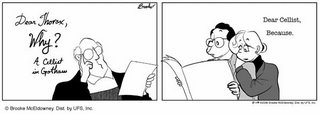
I'm perfectly in control of my day right up till the time I finish breakfast. After that, I feel increasingly powerless and anxious.
The fact that I recently started in on the second half of my fifth decade just makes things worse; before I know where I am, I'll be 60 and after that I'll pick up speed the further along the path of life I get.
Friday things just seemed to get more gloomy the further the day progressed. I felt as though there was a black cloud hanging over my head as the afternoon dragged on. I tried to stay impassive, in keeping with the tradition of the stoic Australian male, but I felt bloody awful.
Julie's friend Jan asked me if I was coming to the fireworks display tomorrow night.
"No." "Why not?" "I think I'm having an anxiety attack."
I was happy to keep it to myself, but faced with a direct question I lacked the patience to make up a polite excuse.
Some caregivers think their stress will drop once an elderly relative is placed in a long term facility, but they actually suffer more emotional trauma. A University of Pittsburgh study is the first to provide a comprehensive analysis of the emotional turmoil caregivers experience in placing a loved one with dementia in a long-term care facility.
"Caregivers have to face new challenges such as frequent trips to the long-term care facility, reduced control over the care pro- vided to their relative, and taking on responsibilities such as coordinating and monitoring care," says study leader Richard Schulz. "This study shows that we need to help care- givers who place their relatives." The findings appear in Journal of the American Medical Association.
I can believe that. Being a carer is a stressful job and the emotional connection doesn't end just because the person in question is physically out of the house. It never did for me. Cutting down on the angst factor is difficult.
And by the way, thanks to Wikipedia for their informative article that told me Angst is used in English to describe an intense feeling of emotional strife – a different but related meaning is attributed to Danish philosopher Søren Kierkegaard .
Kierkegaard used the word angst (Danish, meaning "dread") to describe a profound and deep-seated spiritual condition of insecurity and despair in the free human being. Where the animal is a slave to its God-given instincts but always confident in its own actions, Kierkegaard believed that the freedom given to mankind leaves the human in a constant fear of failing its responsibilities to God.
In modern use, angst is broadened to include general frustration associated with the conflict between actual responsibilities to self, one's principles, and others (possibly including God).
That's more the sense that I would use it in.


2 comments:
Mike-- Do you have a specific reference for the U. of Pittsburgh study -- I'm interested in reading more about it. Feel free to email me at jeff at assistguide dot com (My Blogger identity points to my personal blog, but I also publish The Long-Term Care Weblog -- http://www.theltcblog.com).
Yes, try this:
http://www.scienceblog.com/community/older/2004/9/20048935.shtml
Post a Comment